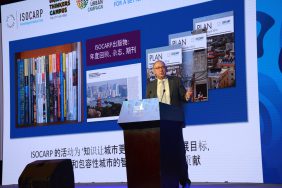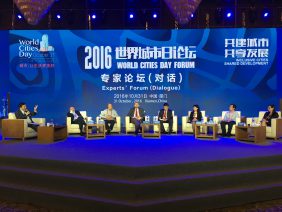 Monday 31st of October, ISOCARP participated in the World Cities Day Forum in Xiamen, China. This international event with hundreds of international and Chinese delegates, was hosted by the Ministry of Housing and Urban-Rural Development of the People’s Republic of China, UN-Habitat and the Fujian Provincial Government. The United Nations selected ‘Inclusive Cities, Shared Development’ as the theme of this annual event in order to highlight the important role of urbanization as a source of global development and social inclusion. Mr. Ban Ki-moon, Secretary General of the United Nations, and dr. Joan Clos, UN-Habitat Executive Director, opened the World Cities Day Forum with video messages emphasizing that the Sustainable Development Goals and the New Urban Agenda, recently adopted in Quito, are very important to make better, sustainable, inclusive and peaceful cities.
Monday 31st of October, ISOCARP participated in the World Cities Day Forum in Xiamen, China. This international event with hundreds of international and Chinese delegates, was hosted by the Ministry of Housing and Urban-Rural Development of the People’s Republic of China, UN-Habitat and the Fujian Provincial Government. The United Nations selected ‘Inclusive Cities, Shared Development’ as the theme of this annual event in order to highlight the important role of urbanization as a source of global development and social inclusion. Mr. Ban Ki-moon, Secretary General of the United Nations, and dr. Joan Clos, UN-Habitat Executive Director, opened the World Cities Day Forum with video messages emphasizing that the Sustainable Development Goals and the New Urban Agenda, recently adopted in Quito, are very important to make better, sustainable, inclusive and peaceful cities.
ISOCARP Vice President UPATs Martin Dubbeling was invited to present how the activities and the motto of ISOCARP ‘Knowledge for better Cities’ contribute to the enhancement of Inclusive Cities and Shared Development. In his keynote speech he stated that there are no other disciplines than urban planning and urban design that have the capacity to implement most of the 17 Sustainable Development Goals. To illustrate this statement he presented the results of the UPAT workshops in China and Palestine. Immediately after his keynote, Martin Dubbeling took the initiative to present hard copies of the three Magazines with the results of the Gaza and West Bank UPAT Workshops to dr. Aisa Karibo Kacyira, Assistant Secretary General and Deputy Executive Director of UN-Habitat. She happily accepted the three Magazines, complimenting ISOCARP with the results and with the three publications.
ISOCARP Vice Presidents Shi Nan and Piotr Lorens, representing the Urban Planning Society of China and the Society of Polish Town Planners respectively, contributed to the Experts’ Forum on inclusive urban governance. Shi Nan moderated this forum that addressed the new challenges related to urban planning and public participation. Piotr Lorens emphasized that national planning societies must take the lead in generating and benchmarking knowledge in the fast changing realities of urban planning in order to support national and local government in the present challenges of governance that is inclusive and open to the public they serve.
